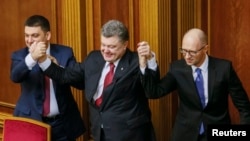The European Union on Thursday added five separatist groups and 13 Ukrainians to the bloc's sanctions list for their roles in elections this month in rebel-held eastern Ukraine, diplomats said.
The action taken by the 28 EU ambassadors "responds to the separatist vote which undermined ... the implementation of the Minsk protocol" establishing a cease-fire in the region, one of the sources told the French news agency AFP.
The EU targeted the Ukrainian individuals with asset freezes and travel bans and the organizations with asset freezes, an EU source said.
The names were kept secret but are expected to be published in the EU's Official Journal on Saturday, according to EU procedure. The organizations targeted are mainly political groups rather than companies, diplomats said.
The new blacklist adds to the previous EU sanctions list over Ukraine that already covers 119 people and 23 entities, all facing similar sanctions of travel bans and asset freezes. The list includes close allies of Russian President Vladimir Putin, Russian oligarchs and rebel leaders.
The ministers stopped short of fresh economic sanctions against Russia, saying there was hope of restarting dialogue with Moscow to end the worst standoff since the Cold War.
EU governments are also discussing proposals for an “enhanced ban” on investments in Crimea as part of the EU's policy of refusing to recognize Russia's annexation of the Ukrainian region in March.
Parliament opens session
Also Thursday, Ukraine President Petro Poroshenko set out a strongly reformist agenda during the inaugural session of parliament, calling for the immediate overhaul of a justice system that he said was corrupt from the top down.
Poroshenko said the justice system's shortcomings posed a national security risk.
“It is quite clear that the primary reason for the low standard of life of the majority of Ukrainians is the totally corrupted government apparatus,” he said, according to The Associated Press.
Poroshenko told parliament that he would be a "reliable ally" in carrying out the "reform-minded, pro-European" agenda of the ruling five-party coalition.
Ukraine's new parliament also elected Prime Minister Arseny Yatsenyuk for a new term at its opening session on Thursday, with 341 deputies in the 450-seat parliament voting for him to stay on in the position he has held since February.
For Ukraine, combatting corruption and re-orienting the country toward Europe, and away from Russia, have been dominant themes of national politics since former President Victor Yanukovych was ousted in February after months of protest.
In an apparent reference to the pro-Russian separatists in eastern Ukraine, Poroshenko said "100 percent" of Ukrainians are for a "unified state" and a "constitutional majority" see Ukraine "as a single country," and therefore there will be no "federalization."
A vote last month ushered in a new parliament that draws together a variety of pro-Western parties and colorful political figures, including crusading anti-corruption campaigners and commanders of paramilitary units fighting Russian-backed separatists in the east.
Yanukovych's Party of Regions is no longer represented in parliament, although some of his allies were elected within the Opposition Bloc.
Outside parliament, hundreds of riot police guarded the building in Kyiv as parliament met, while activists held Ukrainian flags and posters with slogans reading, "No words, just actions" and "Don't promise but act."
On Thursday, the Kremlin said Russian President Vladimir Putin discussed bilateral relations and the situation in southeast Ukraine with Poroshenko on the telephone Wednesday evening.
The statement said that the call was on the initiative of Ukraine. It gave no further details.
Russian Prime Minister Dmitry Medvedev also called Yatsenyuk to discuss economic relations between the two countries, the Russian government press service reported on Thursday.
Two killed on Thursday
Also on Thursday, a 12-year-old boy and a 55-year-old woman were killed by shelling in the eastern Ukrainian separatist stronghold of Donetsk on Thursday, the city administration reported, despite a Sept. 5 cease-fire deal.
According to U.N. data an average of 13 soldiers, rebels and civilians have died every day since a formal cease-fire was agreed by Ukraine, Russia and the rebels, with Ukrainian government forces and the separatists accusing each other of violating the terms of the truce.
Donetsk city administration, which is aligned with Kyiv, said the child was killed in the street and the woman when a shell hit her flat in an area pummeled by artillery fire in recent days.
Many buildings in the district bear witness to the intensity of the recent shelling, including a pediatric hospital, where a shell crashed through the roof and others left craters in the road outside.
Survey on Russian troops
Meanwhile, a majority of Russians believe their country's troops are not fighting in eastern Ukraine but nearly half would be glad if it turned out they were, an opinion poll showed on Thursday.
The poll by the independent Levada research group suggested 25 percent of respondents did not believe the Kremlin's denials that Russia has sent soldiers to back separatists fighting Ukrainian government forces in the eastern regions.
The survey of 1,600 people, carried out from Nov. 14-17, showed 53 percent did believe the Kremlin although 45 percent would react positively if they found out their soldiers are fighting there. The poll said 34 percent would disapprove.
NATO's top military commander said on Wednesday Russian soldiers provided the “backbone” to the rebels.
Russia also initially denied having troops in the Crimea peninsula, which it annexed in March, until President Vladimir Putin acknowledged weeks later that they had been there.
Material for this report came from Reuters, AFP and AP.





